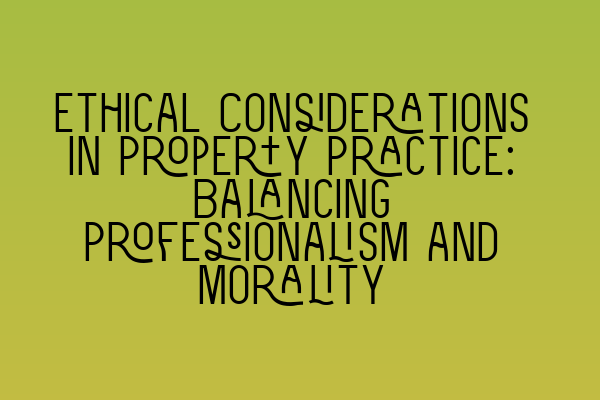The practice of property law carries with it a significant responsibility, not only to our clients but also to society as a whole. As solicitors, it is crucial that we not only adhere to professional standards but also consider the ethical implications of the work we undertake.
When it comes to property law, there are a multitude of ethical considerations that must be taken into account. Balancing professionalism and morality is not always a straightforward task, but it is essential for ensuring the integrity of our profession.
One of the key ethical considerations in property practice is the duty of candor. As solicitors, we have a duty to be honest and transparent with our clients, ensuring that they are fully informed about any relevant information or legal issues concerning their property matters. This duty extends to providing accurate advice and information, even if it is not always favorable to our clients’ interests.
Another important ethical consideration is the duty to avoid conflicts of interest. It is essential that we act in the best interests of our clients and avoid any situation where our personal interests may conflict with those of our clients. This includes disclosing any potential conflicts and seeking informed consent from affected parties.
Respecting the confidentiality of client information is also a fundamental ethical consideration in property practice. As solicitors, we must ensure that client information remains confidential and is not disclosed without proper authorization. This duty of confidentiality extends to both current and former clients and is crucial for maintaining client trust and confidence.
Moreover, property practitioners must uphold the principles of fairness and equality. We should not discriminate against clients based on their race, gender, religion, or any other protected characteristic. It is our duty to treat all clients with respect and provide equal access to legal services, ensuring fairness in our practice.
Engaging in responsible and sustainable practices is another ethical consideration in property law. As professionals, we should consider the social and environmental impacts of our actions and seek to minimize any adverse effects. This may include advising clients on environmentally friendly practices or supporting initiatives that promote social welfare.
In summary, the practice of property law demands more than just professional expertise. It requires a deep understanding of the ethical implications of our work and a commitment to upholding professional standards while also considering the moral aspects of our practice.
At SQE Property Law & Land Law, we recognize the importance of ethical considerations in our practice. Through our SQE 1 and SQE 2 preparation courses, we ensure that aspiring solicitors are equipped with the knowledge and skills to navigate the ethical challenges of property law.
If you’re preparing for the SQE exams, we recommend taking advantage of our SQE 1 Practice Exam Questions and SQE 1 Practice Mocks FLK1 FLK2 to enhance your proficiency. These resources will not only help you prepare for the exams but also broaden your understanding of the ethical considerations in property practice.
As solicitors, it is our duty to prioritize professionalism and morality in our property practice. By adhering to ethical standards and considering the broader implications of our work, we can ensure that our clients receive the highest level of service while also upholding the values of our profession.
For more information about our SQE 2 Preparation Courses, SQE 1 Preparation Courses, and SRA SQE Exam Dates, please visit our website.
